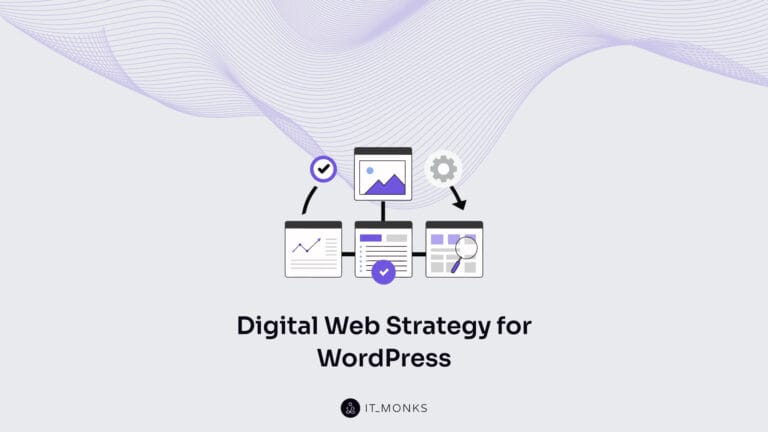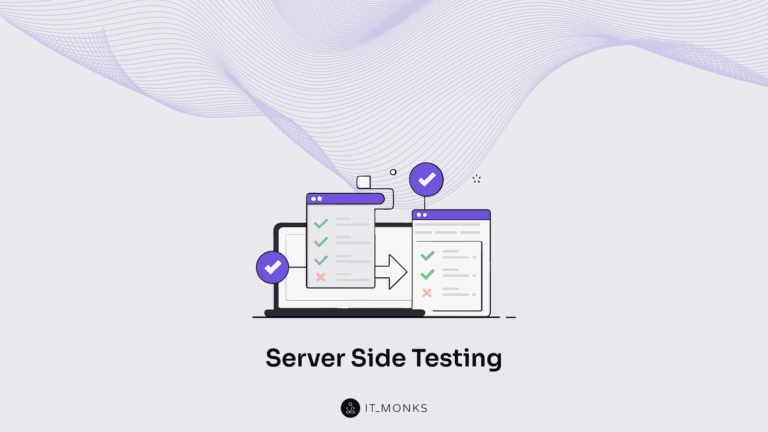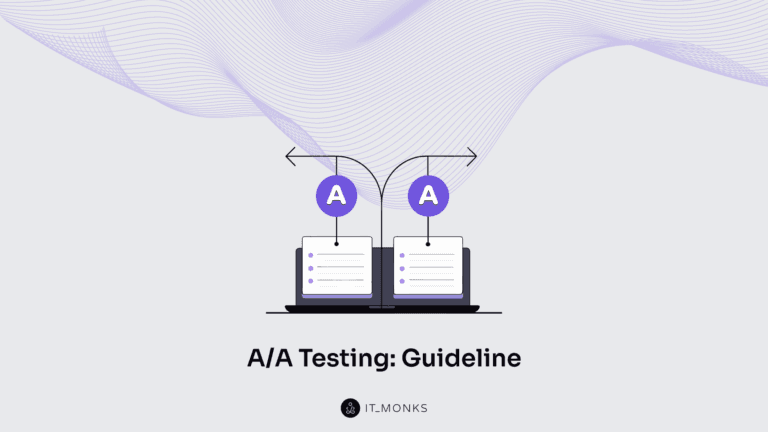What is Enterprise SEO?
Table of Contents
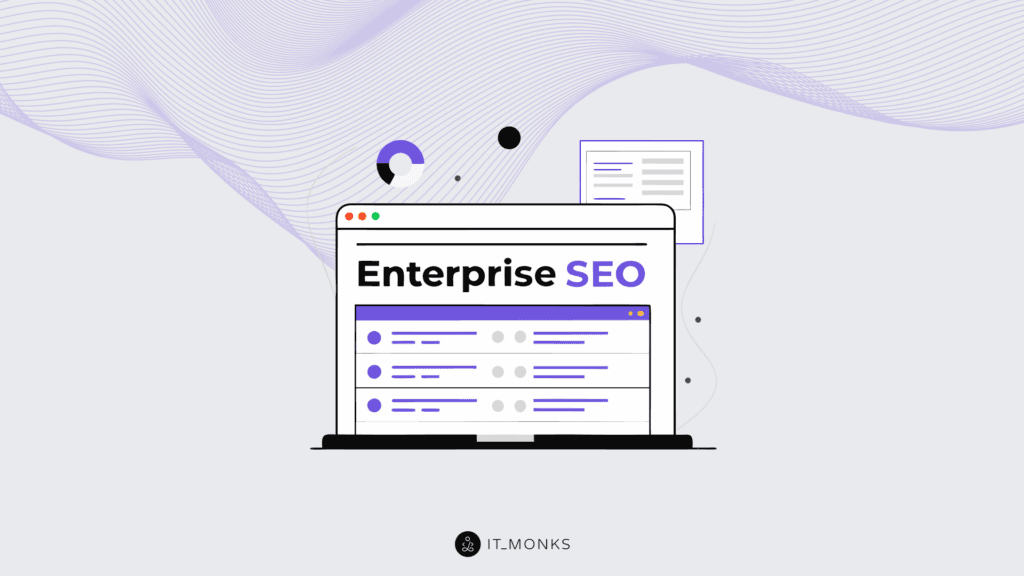
Enterprise SEO is a specialized approach to search engine optimization for large businesses with complex websites. It improves rankings, drives organic traffic, and generates leads and sales by addressing the unique challenges of managing and optimizing thousands or millions of pages.
Unlike small business websites, large-scale websites must be designed to manage vast amounts of data, scale with growth, support diverse functions, and integrate seamlessly with various software systems.
The SEO strategy for such websites differs from traditional SEO and requires advanced tools like Jetoctopus, Botify, Ahrefs, BrightEdge, seoClarity, Google Search Console, and Conductor for efficient keyword research, crawling, and optimization.
By leveraging these tools and a robust strategy, enterprise SEO enhances visibility, attracts users, and strengthens brand authority. It improves user experience and conversion rates, offering a cost-effective path to sustainable growth and industry leadership.
What is the Difference Between Enterprise SEO and Traditional SEO?
The difference between enterprise SEO and traditional SEO is primarily the optimized website’s scale and the level of resources needed to manage it.
Enterprise SEO focuses on large, complex websites with hundreds to millions of pages, requiring advanced strategies, coordination across departments, and a high budget.
Traditional SEO focuses on smaller websites with a few to several hundred pages, utilizing basic strategies and limited resources.
The main differences between enterprise SEO and traditional SEO are:
- Website size: enterprise SEO handles large websites with hundreds to millions of pages, like Amazon’s product pages or MSN’s news content. Traditional SEO targets smaller sites with fewer pages, such as blogs or local business websites.
- Organizational complexity: enterprise SEO requires cross-department collaboration (SEO, web developers, marketing teams), while a single team or individual typically handles traditional SEO.
- Budget and resources: enterprise SEO demands higher budgets (averaging $11,500 to $21,500 per month) and more resources, whereas traditional SEO has a smaller budget ($2,500–$7,500 per month) and resource allocation.
- Target market: enterprise SEO targets global audiences, while traditional SEO focuses on localized or niche markets.
- Strategy complexity: creating an SEO strategy for an enterprise site with 100,000 pages requires a more comprehensive, systematic approach compared to optimizing 100 pages of a small business project, involving specialized enterprise SEO tools, cross-functional collaboration, and robust governance models to maintain consistency across the entire digital ecosystem.
Enterprise SEO Team
An enterprise SEO team is a dedicated group of specialists optimizing large-scale websites for better search rankings.
Typically, an enterprise SEO team consists of 6 to 10 professionals. Larger teams of 10 or more are common in organizations with more complex websites or advanced requirements, where specialized skills are essential for effective enterprise SEO management.
Enterprise SEO Processes
Enterprise SEO processes is a large-scale, strategic approach to search engine optimization used by large companies, focusing on the enterprise website’s technical optimization, keyword strategy development, content marketing at scale, enterprise link building, local SEO for multi-location enterprises, and SEO analytics.
Let’s discuss each of these processes in detail.
Enterprise Website Technical Optimization
Enterprise website technical optimization is a key process of enterprise SEO, focusing on enhancing site speed, mobile-friendliness, structured data implementation, URL structure management, and fixing broken links to ensure search engines can crawl and index the pages of large-scale businesses efficiently.
Enterprise Keyword Strategy
Enterprise keyword strategy is a process within enterprise SEO focused on identifying and strategically using relevant keywords across a large website to improve organic search visibility and drive targeted traffic.
Key elements of an enterprise keyword strategy include:
- extensive keyword research using advanced tools, like Ahrefs, Semrush, etc.,
- content mapping for proper keyword distribution,
- competitive analysis to identify opportunities,
- scalability for managing keywords across teams and websites,
- and data-driven optimization to refine strategies based on performance and user behavior insights.
Content Marketing at Scale
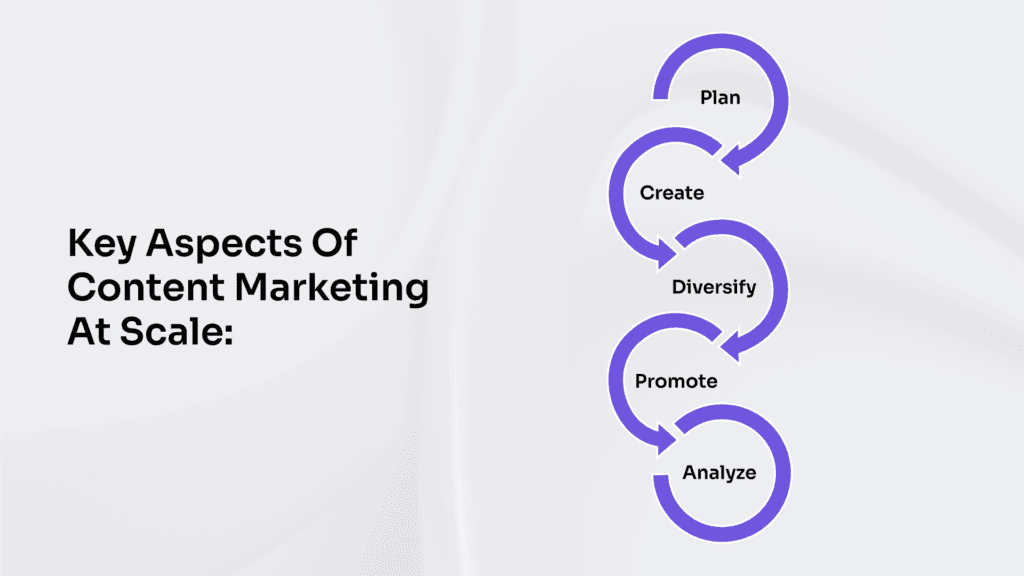
Content marketing at scale is an enterprise SEO process where large companies create and distribute content across various channels (like an enterprise website, social media, email, etc.), aiming to rank high in SERPs, generate volumes of organic traffic, drive brand awareness and lead generation on a large scale.
Key aspects include strategic content planning to align with business goals, an efficient content creation workflow, content diversification through various formats like blogs and videos, SEO optimization for better ranking, promoting content via social media and paid ads, and measuring performance through analytics to refine future strategies.
Enterprise Link Building
Enterprise link building is an enterprise SEO process of acquiring high-quality backlinks to improve the search visibility and rankings of large, complex websites.
It focuses on building links from authoritative sources across multiple sections of an enterprise business’s website, like product and service pages, landing pages, blog posts, etc.
Local SEO for Multi-Location Enterprises
Local SEO for multi-location enterprises is an SEO process of optimizing a business’s online presence to rank higher in local search results across multiple geographic locations.
This process includes using location-specific keywords to target local searches and creating dedicated pages with detailed information for each branch. Additionally, managing Google Business Profiles for accuracy and reviews is essential.
Ensuring consistent NAP (Name, address, Phone number) details, acquiring local backlinks, and creating localized content further enhance visibility and engagement across various locations.
SEO Analytics
SEO Analytics is the process of collecting and analyzing large-scale search engine data to optimize website performance and improve organic search rankings.
It covers such aspects as analyzing large datasets to track queries and user interactions on enterprise websites and leveraging keyword performance and engagement metrics to guide improvements.
By utilizing tools that handle vast data volumes and automate performance tracking, SEO analytics also integrates data from social media, analytics platforms, and CRM systems for a holistic view.
Completing SEO analytics and other tasks associated with enterprise SEO becomes easier and more effective when teams are equipped with the right tools.
What Are the Tools for Enterprise SEO?
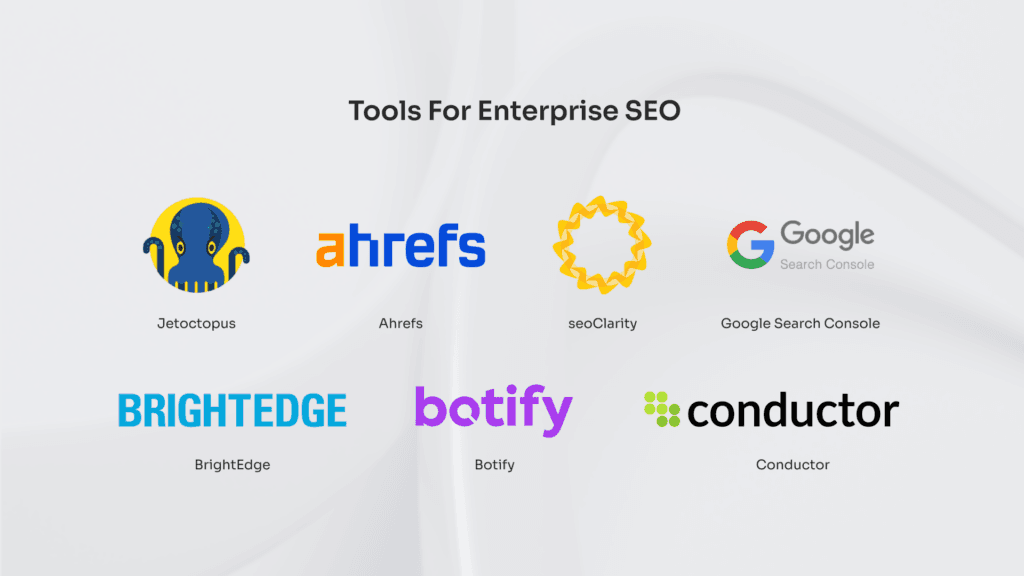
Key tools for enterprise SEO include Jetoctopus for website crawling and log analysis, Ahrefs for keyword and backlink research, BrightEdge for SEO performance insights, Google Search Console for monitoring search rankings, seoClarity for content optimization, Botify for performance tracking, and Conductor for competitor analysis.
Let’s review each of these tools in detail.
Jetoctopus
Jetoctopus is an enterprise SEO tool focused on large-scale website crawling and log analysis. The main purpose of Jetoctopus is to conduct thorough technical SEO audits, allowing businesses to identify and fix problems that could impede search engine crawling and indexing.
Key features of Jetoctopus include deep website crawling to reach even the most nested pages, integration with server logs to track crawl errors, and Google Search Console data to offer a unified view of SEO performance.
The tool also provides real-time website monitoring, on-page analysis, and customizable reports tailored to specific SEO needs. Additionally, it visualizes site structure with 3D SEO models, aiding in efficient problem detection and resolution.
Ahrefs
Ahrefs is an SEO tool that excels in providing detailed keyword, content, and backlink research.
The main purpose of Ahrefs in enterprise SEO is to perform large-scale site audits, identify SEO issues, and optimize website performance. It also helps with competitor analysis, allowing businesses to track competitors’ backlinks, keywords, and content strategies to find new opportunities.
Key features of Ahrefs include its site audit tool, which detects technical SEO problems, broken links, and other issues. The backlink profile feature provides a comprehensive view of referring domains and link quality, while the keyword explorer helps uncover valuable keywords with detailed metrics.
Ahrefs also offers rank tracking, organic search analysis, and content discovery tools to optimize content strategies effectively.
BrightEdge
BrightEdge is an enterprise SEO tool that helps businesses track and optimize their website performance by providing insights into keyword rankings, content optimization, and overall SEO health.
The main purpose of BrightEdge in enterprise SEO is to help businesses understand customer search behavior and create strategies that align with user intent. It provides tools for tracking keywords, analyzing competitive performance, and offering content recommendations to improve relevancy and search engine ranking.
Google Search Console
Google Search Console is a free SEO tool from Google that helps businesses monitor and improve their website’s performance in Google Search by providing insights into indexing issues, organic traffic, and keyword performance.
It also enables businesses to identify technical problems and optimize their website’s visibility across multiple domains.
Key features of Google Search Console include detailed search analytics, which reports on impressions, clicks, and search rankings.
The URL Inspection Tool allows businesses to check the indexing status of individual pages. Sitemaps can be submitted to ensure efficient crawling, while the Mobile Usability Report analyzes mobile performance.
It also features a Structured Data Testing Tool to verify structured data implementation, and Manual Actions notifications alert businesses to potential penalties from Google.
seoClarity
seoClarity is an enterprise-level SEO tool providing large businesses with insights into keyword research, competitor analysis, on-page optimization, and content performance tracking.
Key features of seoClarity include advanced keyword research tools that inform content strategies, detailed competitor analysis to identify content gaps, and on-page optimization insights for improving website elements like meta descriptions and title tags.
The tool also offers rank tracking across search engines and regions, content auditing to assess SEO potential, and technical SEO tools for identifying crawling and indexing issues. Automated reporting ensures SEO teams can easily share performance data and insights with stakeholders.
Botify
Botify is an enterprise SEO tool designed to help businesses enhance website performance through deep crawling and technical audits. It helps businesses identify SEO issues, track rankings, evaluate content effectiveness, and analyze competitor strategies, enabling data-driven decisions for large-scale SEO efforts.
Key features of Botify include advanced website crawling to detect technical issues like broken links or slow loading times, rank tracking across different search engines, and content analysis to assess keyword use and user engagement.
It also provides competitor analysis to uncover opportunities for SEO improvement, visualizes data through intuitive dashboards, and offers customizable alerts and reporting to keep SEO teams informed about critical issues. With its scalability, Botify is ideal for managing SEO across large websites with extensive content.
Conductor
Conductor is an enterprise SEO tool designed to help large businesses enhance their organic online presence. Its primary purpose is identifying critical search terms, analyzing competitor strategies, and guiding content creation to improve search engine rankings.
The key features of Conductor include advanced keyword research to discover valuable search terms, content optimization analysis to improve content relevance and quality, and rank tracking to monitor website performance in search results.
It also provides competitor monitoring to uncover strategies to boost SEO efforts and detailed reporting to support data-driven decisions.
What Are the Challenges of Enterprise SEO?
- Managing large-scale websites with hundreds to millions of pages, requiring advanced strategies;
- Coordinating efforts across multiple departments like IT, marketing, and content teams to maintain a unified SEO approach;
- Allocating a significantly higher budget than traditional SEO and managing resources effectively;
- Analyzing and optimizing SEO performance across numerous pages, which can overwhelm traditional tools;
- Navigating complex technical issues like site structure, crawlability, and page speed;
- Aligning SEO strategies across diverse teams and regions while maintaining consistency;
- Staying updated with evolving search engine algorithms and adapting strategies accordingly.
Enterprise SEO Strategy
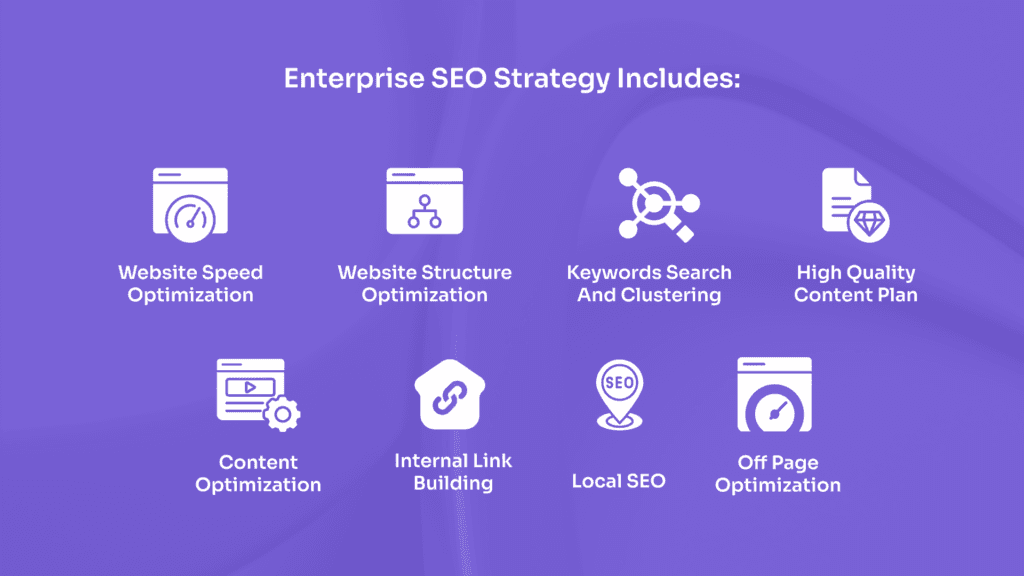
Enterprise SEO strategy is a tailored approach for large, complex websites aiming to improve search engine visibility and rankings by optimizing content across multiple pages using advanced tools and techniques.
Key strategies for enterprise SEO include optimizing website speed, structure, and content and implementing keyword search and clustering. Internal link building, off-page optimization, and local SEO are also crucial for improving visibility and engagement.
Website Speed Optimization
Website speed optimization is an SEO strategy for enhancing website loading speeds to improve user experience and search engine rankings. This involves image optimization, using CDNs, server optimization, code minification, and mobile optimization to enhance overall performance.
Website Structure Optimization
Website Structure Optimization is a strategic approach to organizing website content in a clear and logical hierarchy. It involves using relevant keywords in URLs, implementing internal linking, and ensuring easy navigation to help users and search engines understand the site’s content and relevance.
For enterprise SEO, this strategy aims to improve search engine rankings by making it easier for search engines to crawl and index content. A well-structured website helps to improve user experience and accessibility, ultimately boosting SEO performance.
Keywords Search and Clustering
Keyword Search and Clustering is an SEO strategy that involves researching a broad range of relevant keywords and grouping them into clusters based on meaning and search intent.
This approach helps create focused content pages that address specific topics comprehensively, improving search engine rankings by delivering more relevant and targeted information to users.
Organizing keywords into clusters allows businesses to develop content that aligns with user intent and optimizes website performance. Implementing keyword clustering ensures the website covers a wide range of related topics, driving more targeted traffic and improving rankings.
High-Quality Content Plan
A high-quality content plan is an SEO strategy that creates valuable and relevant content tailored to the target audience’s search intent. It incorporates strategic keyword usage, optimized for search engines, and emphasizes thorough research, user experience, and consistent content creation across multiple formats.
The purpose of this strategy for enterprise SEO is to drive organic traffic by delivering content that resonates with users and ranks highly on search engines.
By focusing on quality, relevance, and consistency, businesses can establish authority, enhance user engagement, and build a strong backlink profile, ultimately improving search engine visibility and ranking.
Content Optimization
Content optimization is an SEO strategy aimed at improving search engine rankings by enhancing the quality and structure of content.
This includes using relevant keywords, clear headings, and engaging visuals and optimizing meta descriptions, title tags, and internal links to boost visibility and attract more organic traffic.
The purpose of content optimization in enterprise SEO is to ensure that content meets both user needs and search engine requirements.
By aligning content with search intent and making it easy for search engines to index, businesses can drive more organic traffic, improve SERP rankings, and enhance user engagement.
Internal Link-Building
Internal link-building is an SEO strategy focused on creating links between relevant pages within an enterprise website.
This strategy helps search engines better understand website structure, prioritize key content, and improve user navigation. Directing link equity to important pages, it boosts the overall ranking and visibility of a large-scale business website.
Off-Page Optimization
Off-page SEO optimization is an enterprise SEO strategy focused on enhancing a website’s authority and search engine rankings through external efforts. This involves acquiring high-quality backlinks from reputable sites, boosting engagement outside the website, and improving online visibility.
Key tactics include guest blogging, influencer marketing, social media promotion, and managing brand mentions across the web.
Local SEO
Local SEO is an SEO strategy focused on enhancing a business’s online visibility in local search results through optimizing websites for local keywords, managing and regularly updating a Google Business Profile, and ensuring consistent NAP (Name, Address, Phone number) information across the web.
The strategy also includes creating local-focused content, engaging with the local community on social media, and building backlinks from local sources to improve search engine rankings and attract relevant traffic.
Is Link-Building Enough for a Good SEO?
No, link-building alone is not enough for a successful SEO strategy. SEO is a complex and multifaceted discipline that requires more than just acquiring backlinks.
While link-building is a crucial component, it needs to be part of a multidimensional approach that includes creating high-quality content, on-page optimization, technical SEO, and a positive user experience.
How to Make a Well-Optimized Enterprise Website?
To create a well-optimized enterprise website, focus on implementing robust technical SEO processes to enhance scalability, speed, and performance, along with on-page, off-page, and local SEO strategies.
Optimizing an enterprise for SEO includes such steps as:
- Improve technical SEO: Enhance site structure, page speed, and mobile-friendliness.
- Optimize on-page SEO: Conduct keyword research, create content, and refine title tags, meta descriptions, and URLs.
- Boost off-page SEO: Focus on link-building and promote through social media.
- Implement local SEO: Optimize for local search if relevant to your business.
In enterprise SEO, special attention is applied to technical SEO because of the complexity of large-scale business sites, where even minor technical changes can impact search engine crawling and indexing, affecting hundreds to millions of pages.
This is why the requirements for enterprise website development differ significantly from those of smaller business projects.
For large-scale companies, the decision often comes down to choosing between a custom enterprise website development service or utilizing a website builder.
This choice plays a pivotal role in determining your website’s technical performance — particularly its scalability and flexibility — which directly impacts its SEO performance.
Custom Website Development VS Website Builder
Custom website development outperforms website builders in technical SEO by offering a wider range of services that enhance website performance, scalability, and loading speed. In contrast, website builders typically provide limited customization options and lack the flexibility required for advanced SEO optimization, which restricts their full SEO potential.
To dive deeper into the discussion of custom enterprise web development, check our guide to learn how else businesses can benefit from custom websites, including essential enterprise website development solutions and strategies.
Contact
Don't like forms?
Shoot us an email at [email protected]

